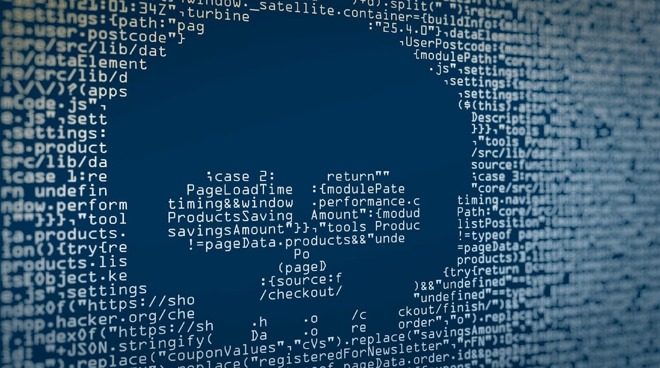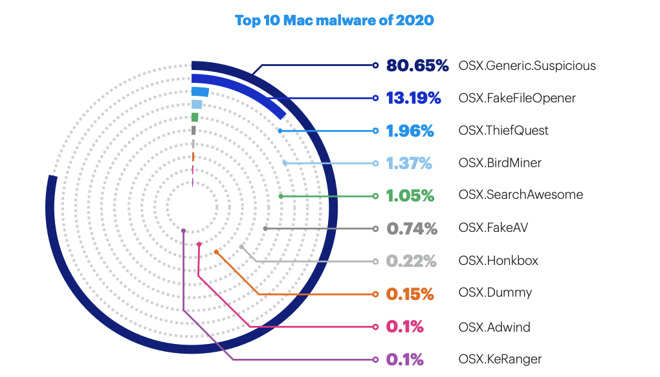Malware on Mac is still a small threat -- but growing
Digital threats were less of an issue for Mac users in 2020 over previous years, according to Malwarebytes, but adware continues to be more of a threat than malware on macOS.

Macs are anecdotally considered to be a safer computing platform than Windows and Android, in part due to how Apple handles applications and security. In a report by Malwarebytes into malware threats that were detected by users in 2020, it seems that the point is justified.
According to the report, the number of detected threats by Mac users dropped overall from over 120 million in 2019 to over 75 million in 2020, representing a 38% reduction year-on-year. Consumer detections made up the lion's share of what was observed and had dropped 40% annually, while detections by business users grew 31% over the same timeframe.
By comparison, Windows users of Malwarebytes detected threats 111 million times in 2020. This too is a reduction from over 125 million in 2019, representing a drop of 12%.
While the millions of detections sounds scary, only a very small proportion of Mac detections are for malware. For US Mac users, malware represented just 1 percent of the total, rising to less than 5 percent in countries like Australia, the UK, and Canada.
Bigger percentages of malware were detected more often in countries including South Korea (18.1%), the Ukraine (16.3%,) and Norway (15%.)
The vast majority of the threat detections stemmed from "Potentially Unwanted Programs" (PUPs) and adware, though there were no discernible patterns. Overall, PUPs made up more than 76% of Mac detections in 2020, with Adware making up about 22%.

Malware only made up 1.5% of total Mac detections. While small, Malwarebytes claims malware detections on Mac grew by more than 61% in 2020.
The majority of these detections were deemed to be "suspicious behaviors," such as attempts to run obfuscated Python or a shell code as a persistent process. This occurred in over 80% of detections.
Second place was the OSX.FakeFileOpener, a series of malicious apps that hijacks macOS' system to determine which app should open a file.
Third place, OSX.ThiefQuest or EvilQuest, was interesting for Malwarebytes, as it spread through seemingly legitimate installers found on software piracy repositories. Once installed, the malware would start encrypting files and work like ransomware, but in reality it was a data exfiltration scheme.

Macs are anecdotally considered to be a safer computing platform than Windows and Android, in part due to how Apple handles applications and security. In a report by Malwarebytes into malware threats that were detected by users in 2020, it seems that the point is justified.
According to the report, the number of detected threats by Mac users dropped overall from over 120 million in 2019 to over 75 million in 2020, representing a 38% reduction year-on-year. Consumer detections made up the lion's share of what was observed and had dropped 40% annually, while detections by business users grew 31% over the same timeframe.
By comparison, Windows users of Malwarebytes detected threats 111 million times in 2020. This too is a reduction from over 125 million in 2019, representing a drop of 12%.
While the millions of detections sounds scary, only a very small proportion of Mac detections are for malware. For US Mac users, malware represented just 1 percent of the total, rising to less than 5 percent in countries like Australia, the UK, and Canada.
Bigger percentages of malware were detected more often in countries including South Korea (18.1%), the Ukraine (16.3%,) and Norway (15%.)
The vast majority of the threat detections stemmed from "Potentially Unwanted Programs" (PUPs) and adware, though there were no discernible patterns. Overall, PUPs made up more than 76% of Mac detections in 2020, with Adware making up about 22%.

Malware only made up 1.5% of total Mac detections. While small, Malwarebytes claims malware detections on Mac grew by more than 61% in 2020.
The majority of these detections were deemed to be "suspicious behaviors," such as attempts to run obfuscated Python or a shell code as a persistent process. This occurred in over 80% of detections.
Second place was the OSX.FakeFileOpener, a series of malicious apps that hijacks macOS' system to determine which app should open a file.
Third place, OSX.ThiefQuest or EvilQuest, was interesting for Malwarebytes, as it spread through seemingly legitimate installers found on software piracy repositories. Once installed, the malware would start encrypting files and work like ransomware, but in reality it was a data exfiltration scheme.

Comments
https://www.intego.com/buynow?utm_medium=software&utm_source=netupdate&utm_content=about&cid=11010
As for Windows ... it was a magnet for malware because A. it had 97% market share at one point and B. its enterprise and commercial products share much of the same codebase (which was why things like SQL Slammer which primarily exploited an enterprise vulnerability could also affect PCs). As XServe failed and OS X server remains very niche Apple has very little targeting by the most sophisticated threats who go after enterprise software (think the recent SolarWinds issue ... SolarWinds is enterprise software). As for the ones who target end users, those are the less skilled people who go for the most bang for the buck. That is going to be Trojan and ransomware attacks against Windows PCs in corporate and government offices. They aren't going to target the 10-20 guys in that office that have a Mac: low opportunity/rate of return.
So macOS are "a safer computing platform" due to security through obscurity. As macOS diverges further and further from its "kinda sorta" BSD origins, it is actually getting less secure over time, but since its market share is still so small and it isn't being targeted by people who go after corporate or government databases or web servers - because Apple doesn't have an OS or platform that is used for those - it still won't be exploited that much.